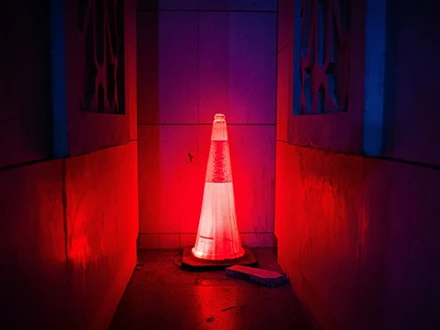Not so long ago people used to notice the number of sheep when travelling around Aotearoa. Nowadays it’s more likely to be the ‘flocks’ of road cones we’ll remember from our latest road trip. Those cones are there for our health and safety but, sometimes, it feels like your blood pressure could be at risk as they funnel you into the traffic jam from hell. Wherever you go. There they are!
Unofficially, there are about 1 million road cones in use around the country. They can last for as little as six months or as long as six years. They sometimes pop up in unexpected places, like on top of buildings and trees.
The orange construction markers, sometimes referred to as ‘witches’ hats’, are made out of PVC, a type of plastic that can be recycled.
Enter Proline Plastics, the only company in New Zealand that makes and recycles road cones.
The Auckland-based company has been doing both since the early ‘90s. Initially recycling was seen as a cost saving measure. Now it’s about using materials more sustainably. In the past three years Proline has recycled about 38 tonnes of road cones. General Manager Cameron Smith, who has promoted sustainability in a range of industries, sees a future when all road cones used here are made and recycled in New Zealand.
“My end goal is to create a circular economy and close that loop. Right now cones are made out of PVC that can be recycled. That’s a start but the next step is to see if they can be made out of other materials with little or no environmental impact but with the same properties of strength, flexibility and visibility.”
Currently most road cones are imported from Asia. Only a fraction are recycled. The recycling process is relatively simple. Old cones are shredded and mixed with new PVC. This combo is then turned into new cones using injection moulding. Currently new cones made at the Otahuhu factory use about 11% recycled material. Cameron says that mix could be increased to about 70% in the near future.
“We’re still using the same machinery that was used in the early 1990s. We’re looking for investment to upgrade which will let us use far more recycled material per cone in a more efficient manner. At present the cost benefit ratio doesn’t stack up.”
Proline recycles road cones from all international manufacturers as long as there is no metal in their production (otherwise the shredding process is a bit like dropping a spoon into your blender). It expects businesses bringing in their old cones to buy the equivalent number of new ones. Without the one-for-one swap, Proline could become a dumping ground for old cones, says Cameron.
“At the moment we’ve got plenty of shredded PVC from old cones but once we shift the mix up to 70% recycled material we’re going to be able to use a lot more.”
With the country using up to 200,000 new cones a year there’s going to be no shortage of cones to recycle. The business is also looking for ways to use recycled PVC in other products it makes.
Proline’s recycling scheme is a good example of voluntary product stewardship in action. It is helping to keep its products out of landfill by recycling and reusing the materials repeatedly. It is part of a growing number of businesses that offer end-of-life solutions for their products, such as repairs and take-back schemes for repurposing, reusing and recycling. Proline has applied to have the scheme government-accredited.

